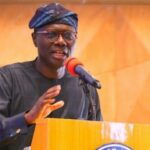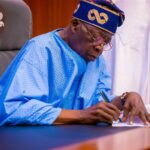The former Governor of Ogun State, Chief Olusegun Osoba, and Leader of the South-South and Pan Niger Delta Forum, Chief Edwin Clark, have pledged unwavering support for the proposed bills seeking to adopt a homegrown Parliamentary system of government.
Speaking during a meeting with Chief Clark at his residence, Minority Leader Hon. Kingsley Chinda observed that Parliamentarians are under pressure to bring about the necessary changes to governance. He argued that the current Presidential system of government is too cumbersome and adds little or no value to the country considering its diversity and background.
Chinda maintained that we need a homegrown structure that considers our background and crafts our laws. Hence, they collectively resolved that “the present style of the presidential system that we are running in Nigeria is too cumbersome for our country, for our background, for our experience, and cannot be repaired as we stand today.”
He emphasized the need to change our structure slightly and come up with a system that suits our setting and environment. Chinda noted that under the existing laws, “a Governor, a President can run the state or the country for four years without talking to Nigerians. There’s no offense; he has committed no offense against our laws. That is why you will hear the likes of Garba Shehu, Ngelale, talking to Nigerians instead of the Number One Citizen of the country.”
Chinda stressed the necessity of a system where public office holders, including elected representatives, are more accountable to the people. He emphasized the importance of public office holders being hands-on rather than administering the people by proxy.
“Our leader, we came with one agenda as representatives elected into the House of Representatives of Nigeria: to make laws for the good governance of this country, to make laws for the peace and progress of Nigeria,” he stated.
“Our leader, you are aware and will not shy away from the fact that our country is not where we all expected it to be today. We are not here to lay blame; we are also not here to delve into issues that may cause discord. Our assignment and our job are to find solutions to some of these problems,” he added.
“As Parliamentarians, we have sat, we have brainstormed, and we are worried. We are concerned that the pressure is on us, and we must move forward,” he continued. “Even with the best of people, if you don’t have the right structure, it becomes difficult for them to succeed,” he stressed.
Regarding the military experience still influencing the country, Chinda maintained that there’s a need for a paradigm shift by reconfiguring the existing laws in a manner that suits our background and diversity for the benefit of all.
After a closed-door meeting with the Parliamentarians at his Abuja residence, former Governor of Ogun State, Chief Olusegun Osoba, affirmed that the Parliamentary system of government is “most economical” and advocates for the devolution of power. He highlighted the burden on the central government, using primary education as an example, stressing the need for localized control in areas like security.
Osoba commended the dynamic and committed young Parliamentarians who aim to make a difference in the country’s future. He expressed gratitude for being alive to witness such dedication.
In his address, Chief Edwin Clark applauded the Parliamentarians’ initiative and stressed that the restructuring of Nigeria cannot wait any longer, as without it, there may not be a Nigeria.
He pointed out that the Constitution drawn in London and rejected by Nigerians after the country became a Republic in 1963 led to the adoption of a homegrown Constitution. Clark emphasized the need for a decentralized system of governance, citing the 1963 Constitution’s provisions and recommending a rotational system for Governors among other reforms.
WATCH TOP VIDEOS FROM NIGERIAN TRIBUNE TV
- Let’s Talk About SELF-AWARENESS
- Is Your Confidence Mistaken for Pride? Let’s talk about it
- Is Etiquette About Perfection…Or Just Not Being Rude?
- Top Psychologist Reveal 3 Signs You’re Struggling With Imposter Syndrome
- Do You Pick Up Work-Related Calls at Midnight or Never? Let’s Talk About Boundaries







